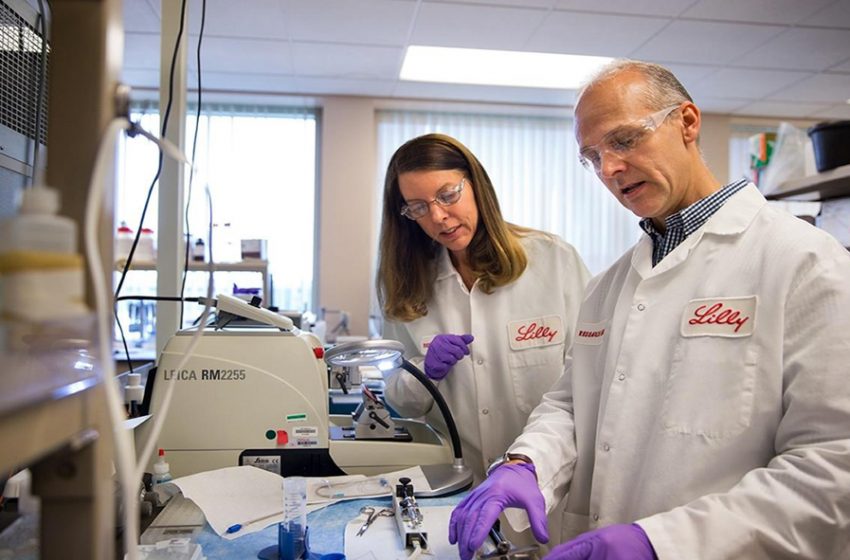Arab Bank Group Reports Record Net Profit of USD 1.13 Billion for 2025, 40% Cash Dividends
Lilly’s Kisunla (donanemab-azbt) showed growing benefit over three years in early symptomatic Alzheimer’s disease

Findings from the TRAILBLAZER-ALZ 2 long-term extension study highlight Kisunla continued to demonstrate slowing of decline, with most participants having completed treatment
Data underscores the value of early intervention and supports a limited duration dosing approach with sustained long-term benefits.
INDIANAPOLIS, August 04, 2025
Eli Lilly and Company (NYSE: LLY) announced results from the long-term extension (LTE) of the Phase 3 TRAILBLAZER-ALZ 2 study showing that participants treated with Kisunla (donanemab-azbt) demonstrated slowing of decline, a benefit that continued to grow over three years compared to an untreated external cohort from the Alzheimer’s Disease Neuroimaging Initiative (ADNI).
Participants in the study who started treatment later still saw benefit. However, earlier initiation of Kisunla in study participants significantly reduced the risk of progression to the next stage of the disease compared to those who received Kisunla treatment later. These data were shared as a late breaking 2025 Alzheimer’s Association International Conference (AAIC) presentation in Toronto.
“The TRAILBLAZER-ALZ 2 long-term extension reaffirms that Kisunla delivered sustained clinical benefit that continued to increase over three years and a consistent safety profile,” said Mark Mintun, M.D., group vice president, Neuroscience Research & Development, Eli Lilly and Company. “Participants continued to show meaningful outcomes, reinforcing the long-term value of early intervention.”
The TRAILBLAZER-ALZ 2 LTE study was a Phase 3, double-blind extension of the original TRAILBLAZER-ALZ 2 trial, evaluating the efficacy and safety of Kisunla in individuals with early symptomatic Alzheimer’s disease. Participants originally treated with Kisunla either continued treatment or were switched to placebo, while those initially on placebo began Kisunla in a blinded manner. An external comparator group from ADNI was used to assess outcomes against a matched, untreated population.
Key preliminary results from the TRAILBLAZER-ALZ 2 LTE study include:
Kisunla benefit continued to grow over three years for participants treated in the study compared to those in the matched ADNI group. Kisunla reduced cognitive decline by -0.6 at 18 months and then –1.2 at 36 months on the Clinical Dementia Rating Sum of Boxes (CDR-SB) in patients initially treated with Kisunla in the core study compared to the ADNI group.
Earlier initiation of Kisunla reduced the risk of progression to the next stage of disease by 27% on the Clinical Dementia Rating-Global Score (CDR-G) compared to a delayed initiation Kisunla group.
More than 75% of participants treated with Kisunla reached amyloid clearance within 76 weeks of starting treatment.
After up to 2.5 years of observed data in participants who had completed treatment, amyloid plaque reaccumulation remained slow at a rate of approximately 2.4 CL/year, consistent with prior observations and modeling.
No new safety signals were observed in the LTE over the three years, further reinforcing the established safety profile for Kisunla.
Amyloid-related imaging abnormalities (ARIA) with edema/effusion (ARIA-E) and with hemorrhage/with hemosiderin deposition are side effects within the class of amyloid targeting therapies that do not usually cause any symptoms, but serious and life-threatening symptoms can occur. ARIA can be fatal. Carriers of one or two copies of the apolipoprotein E ε4 (ApoE4) gene may be at higher risk of developing Alzheimer’s disease and experiencing ARIA. Patients should discuss any safety concerns with their healthcare providers. Kisunla can also cause certain types of allergic reactions, some of which may be serious and life-threatening, that typically occur during infusion or within 30 minutes post-infusion. Headache is another commonly reported side effect. See the Indication and Safety Summary with Warnings below for additional information.
About TRAILBLAZER-ALZ 2 Long-Term Extension (LTE) Study
Participants in the TRAILBLAZER-ALZ 2 (core) study who completed the 76-week placebo-controlled period were eligible to continue into the participant- and investigator-blinded LTE period, lasting an additional 78 weeks.
The LTE study included multiple treatment arms:
Participants (n=550) initially treated with Kisunla in the main study either continued treatment in the LTE or were switched to placebo after meeting pre-defined amyloid clearance thresholds. These participants were followed in the LTE period to assess long-term Kisunla safety and durability of treatment effects.
Participants receiving placebo in the main study switched to Kisunla at the start of the LTE period in a blinded manner to evaluate delayed treatment outcomes. These delayed start participants (n= 657) received Kisunla with the same dosing, administration and stopping criteria as the TRAILBLAZER-ALZ 2 trial. In the study, if the amyloid plaque level was <11 Centiloids on a single positron emission tomography (PET) scan or 11 to <25 Centiloids on 2 consecutive PET scans, the patient was eligible to be switched to placebo. For reference, <24.1 Centiloids on an amyloid PET scan is consistent with a negative visual read.
About TRAILBLAZER-ALZ 2 Study and the TRAILBLAZER-ALZ Program
TRAILBLAZER‐ALZ 2 (NCT04437511) is a multicenter, randomized, double-blind, placebo-controlled (PC) Phase 3 trial designed to assess the efficacy and safety of donanemab in participants with early symptomatic Alzheimer’s disease.
Lilly continues to study donanemab Kisunla in multiple clinical trials, including TRAILBLAZER-ALZ 3, which is evaluating the safety and efficacy of donanemab in patients with preclinical Alzheimer’s disease to determine if it reduces risk of progression to symptomatic Alzheimer’s disease. TRAILBLAZER-ALZ 5 is a registration trial for early symptomatic Alzheimer’s disease currently enrolling in China, Korea, Taiwan, and other geographies. The TRAILBLAZER-ALZ 6 study recently completed the 18-month final study endpoint. Data from the study showed that a modified titration dosing schedule reduced the risk of ARIA-E compared to the TRAILBLAZER-ALZ 2 dosing regimen. These findings supported the FDA approval of an update to the U.S. prescribing information for Kisunla. This data was also presented at AAIC.
About Lilly
Lilly is a medicine company turning science into healing to make life better for people around the world. We’ve been pioneering life-changing discoveries for nearly 150 years, and today our medicines help tens of millions of people across the globe. Harnessing the power of biotechnology, chemistry and genetic medicine, our scientists are urgently advancing new discoveries to solve some of the world’s most significant health challenges: redefining diabetes care; treating obesity and curtailing its most devastating long-term effects; advancing the fight against Alzheimer’s disease; providing solutions to some of the most debilitating immune system disorders; and transforming the most difficult-to-treat cancers into manageable diseases. With each step toward a healthier world, we’re motivated by one thing: making life better for millions more people. That includes delivering innovative clinical trials that reflect the diversity of our world and working to ensure our medicines are accessible and affordable. To learn more, visit Lilly.com and Lilly.com/news, or follow us on Facebook, Instagram and LinkedIn. P-LLY
Cautionary Statement Regarding Forward-Looking Statements
This press release contains forward-looking statements (as that term is defined in the Private Securities Litigation Reform Act of 1995) about Kisunla (donanemab-azbt) as a treatment for people with early symptomatic Alzheimer’s disease, and regulatory approval and other milestones relating to Kisunla and reflects Lilly’s current beliefs and expectations. However, as with any pharmaceutical product, there are substantial risks and uncertainties in the process of drug research, development, and commercialization. Among other things, there is no guarantee that planned or ongoing studies will be completed as planned, that future study results will be consistent with study findings to date, that Kisunla will receive additional regulatory approvals or that Kisunla will be commercially successful. For further discussion of these and other risks and uncertainties, see Lilly’s Form 10-K and Form 10-Q filings with the United States Securities and Exchange Commission. Except as required by law, Lilly undertakes no duty to update forward-looking statements to reflect events after the date of this release.

















